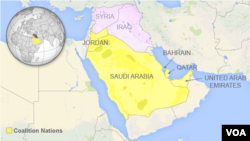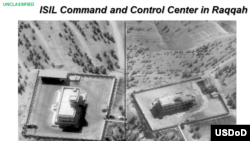President Barack Obama on Tuesday hailed the coalition of Arab states that joined U.S. forces to pound Islamic State targets in Syria, calling it a sign that Middle Eastern people were “standing up for the peace and security that the people of the region and the world deserves.”
Hours earlier, U.S. forces and Arab allies hit dozens of targets, using war planes, remote drones and ship-launched cruise missiles to attack the militants in Syria for the first time.
The attacks, which U.S. officials are calling "very succesful," were the largest of their sort since Obama announced nearly two weeks ago that the U.S. would be stepping up its fight against the group.
The United States also said it launched airstrikes on Syrian territory for because the Syrian government cannot or will not stop the militants from setting up safe havens.
Watch related TV report by Carla Babb:
In a letter to United Nations Secretary General Ban Ki-moon, U.S. Ambassador Samantha Power wrote that the Islamic State group have been using safe havens inside Syria to train, finance and launch attacks against the Iraqi people.
The U.N. Charter calls on member states to prevent such actions on its territory.
The president said the United States was joined by five “friends and partners” — Bahrain, Jordan, Qatar, Saudi Arabia and the United Arab Emirates had either participated or supported the strikes, which involved jets, bombers, drones and ships firing cruise missiles — on behalf of the world’s common security.
"America is proud to stand shoulder to shoulder with these nations on behalf of our common security. The strength of this coalition makes it clear to the world that this is not America's fight alone," Obama said in a brief televised statement. "Above all, the people and governments in the Middle East are rejecting ISIL and standing up for the peace and security that the people of the region and the world deserve."
It wasn’t immediately clear how many militants were killed, though the Syrian Observatory for Human Rights said at least 120 fighters were killed in strikes that hit at least 50 targets in Raqqa and Deir al-Zor provinces in Syria's east. Rami Abdulrahman, who heads the London-based group monitoring the Syria war, said at least 300 people, including members of the Islamic State and al-Qaida, were dead or wounded following the bombings.
U.S. Central Command said 14 airstrikes damaged or destroyed targets in four areas of eastern Syria, including in the Islamic State group's main stronghold of Raqqa.
The president said more than 40 nations have joined the U.S. effort to counter the threat from the Islamic State, including taking out the militant group’s safe havens, training and equipping Iraqi forces and the Syrian opposition, cutting off the group’s financing, and stemming the flow of foreign fighters into and out of the region.
Campaign expected to dominate UNGA
The effort is expected to dominate talks as President Obama meets with Iraq’s prime minister, Arab leaders, and other allies during this week’s U.N. General Assembly.
The coalition building has been taking place ever since the president’s September 10 speech announcing the expansion of the U.S. military’s air campaign into Syria.
U.S. Secretary of State John Kerry has had numerous meetings with Arab leaders in the Middle East to line up their support and involvement. A senior U.S. official said the administration was surprised by how willing these nations were to contribute to the fight against the Islamic State. The official said Saudi Arabia committed early on to carry out airstrikes if needed.
Former American ambassador to Iraq and Afghanistan, Ryan Crocker, tells VOA the fact that Arab nations have lined up to fly bombing missions alongside the United States is crucial.
“This is not about the United States against the so-called Islamic State," he said. "This is a regional fight with regional allies, Arab allies, and Muslim allies standing up to the same foe we face. That, I think, is extremely important.”
Johns Hopkins University conflict management professor Daniel Serwer notes this type of coalition building early on could play a key role in ensuring the success of the mission against the Islamic State over the long term.
“I think it is an important step in the right direction," he said. "It is a little bit unclear exactly what all five did to support the airstrikes and I suppose we'll find that out in due course; but it is important that Sunni Arab countries be seen visibly as willing and able to fight the Sunni Arab terrorists."
Senior administration officials say it is remarkable that within a two-week timeframe, the U.S. Central Command was able to turn commitments from Arab partners into a plan that culminated in the bombing of Islamic State targets in Syria.
More strikes expected
“Last night’s strikes were the beginning of a credible and sustained campaign to destroy and degrade [the Islamic State group]," Lt. Gen. William Mayville, who directs operations for the Joint Chiefs of Staff, told reporters at a Pentagon briefing. “[More] strikes like these can be expected.”
The Pentagon says 96 percent of strikes were with precision-guided missiles, but even so, Syrian rights groups are already blaming U.S. strikes in Syria for about a dozen civilian casualties, including three children.
Lt. Gen. Mayville said the Pentagon was "unaware of any civilian casualties from the strikes."
"Obviously limiting civilian casualties is a top priority to the United States," Mayville told VOA. "And if any reports of civilian casualties emerge we will fully investigate."
Tuesday’s action also pitched Washington for the first time into the three-year-old Syrian civil war, which has killed 200,000 people and displaced millions. U.S. forces have previously hit Islamic State targets in Iraq, where Washington supports the government, but had held back from a military engagement in Syria, where the United States opposes President Bashar al-Assad.
It was unclear exactly what sort of notification the United States had given Syria prior to the attacks.
In a government statement read on state TV, the Syrian Foreign Ministry said Foreign Minister Walid al-Moualem had received a letter from U.S. Secretary of State John Kerry via the foreign minister of Iraq, whose Shiite-led government is a close ally of Damascus.
In a written statement on Tuesday, State Department spokeswoman Jen Psaki said the U.S. did not request permission from Syrian President Bashar al-Assad for the airstrikes, but had notified the country's U.N. representative of the intent to begin the campaign.
Syria confirmed that communication.
Islamic State of Iraq and the Levant
Islamic State of Iraq and the Levant- Formed by members of al-Qaida-linked groups in Syria and Iraq
- Aims to establish an Islamic emirate across Syria and Iraq
- Led by Abu Bakr al-Baghdadi, former leader of al-Qaida in Iraq
- Believed to have 5,000 to 7,000 fighters
- Has launched high-profile attacks in both countries
“We warned Syria not to engage U.S. aircraft," Psaki said in the statement. "We did not request the regime's permission. We did not coordinate our actions with the Syrian government. We did not provide advance notification to the Syrians at a military level, or give any indication of our timing on specific targets. Secretary Kerry did not send a letter to the Syrian regime.”
Asked if there had been any sign that Syrian anti-aircraft defense forces had targeted the coalition planes or missile, Mayville said only there had been "passive radar acquisition." That suggested that Syria deliberately chose not make any moves that could have been seen as threatening or provocative.
As international leaders gathered in New York for the annual United Nations General Assembly, U.N. Secretary-General Ban Ki-moon supported action to protect Syrians from militants who he said "pose an immediate threat to international peace and security."
He urged coalition forces to abide by U.N. principles and international humanitarian law in carrying out their campaign.
"In the case of Syria there can be no genuine protection if extremist groups are permitted to act with impunity and if the Syrian government continues to commit gross human rights violations against its own citizens," he said.
The airstrikes have raised questions about how coalition forces entered foreign airspace in a country with which the U.S. does not maintain direct diplomatic relations.
The Sunni fighters, who have proclaimed a caliphate ruling over all Muslims, alarmed the Middle East by sweeping through northern Iraq in June. They shocked the West in recent weeks by beheading two U.S. journalists and a British aid worker, raising fears that they could attack Western countries.
Alleged Plot Disrupted
American forces also conducted eight airstrikes west of Aleppo against a group of former al-Qaida fighters known as the Khorasan Group. That action was in response to an "imminent" plot against U.S. and Western interests, Central Command said.
"Once again, it must be clear to anyone who would plot against America and do Americans harm that we will not tolerate safe havens for terrorists who threaten our people," Obama said.
Obama said on Sept. 10 he had authorized the expanded use of airstrikes in Syria against the Islamic State. The Sunni fighters, now equipped with U.S. weapons seized during their advance in Iraq, are among the most powerful opponents of Assad, who is a member of a Shiite-derived sect.
They are also battling against rival Sunni groups in Syria, against the Shiite-led government of Iraq and against Kurdish forces on both sides of the border.
In the past week, the militants’ advance has also included Kurdish areas in northern Syria, along the Turkish border, leading to more than 130,000 people crossing into Turkey.
Before Tuesday’s attacks, the U.S. had conducted 190 airstrikes, in an effort to help Iraqi and Kurdish forces push fighters from vulnerable populations and government infrastructure.
Arab Participation
The addition of Arab allies in the attacks was crucial for the credibility of the American-led campaign. Some U.S. allies in the Middle East are skeptical of how far Washington will commit to a conflict in which nearly every country in the region has a stake, set against the backdrop of Islam's 1,300-year-old rift between Sunnis and Shiites.
With the backing of Jordan and the Gulf states, Washington has gained the support of Sunni states that are hostile to Assad. It has not, however, won the support of Assad himself or his main regional ally, Shiite Iran.
Traditional Western allies, including Britain which went to war alongside the United States in Iraq and Afghanistan, have so far declined to participate in the campaign. France has struck Islamic State in Iraq but not in Syria.
Australia Welcomes Strikes; Russia Criticizes
Australian Prime Minister Tony Abbott praised the effort, saying an international effort was needed to combat the Islamic State threat. Australia has promised to contribute 600 troops and eight warplanes.
“This is a global problem,” Abbott told parliament Tuesday. “These are people who have been radicalized and brutalized, and could become potential terrorists in their home countries.”
Australian law enforcement this week conducted sweeping counter-terrorism operations in 25 locations in Sydney and Brisbane, after officials warned of imminent threats from people returning from conflicts in the Middle East. Intelligence officials have estimated 60 Australian nationals are fighting alongside radical groups.
The sweeps resulted in two people being charged with serious offenses.
In Moscow, meanwhile, Russia said the attacks they should have been agreed upon with its ally Damascus and would fuel tension in the region.
“Any such action can be carried out only in accordance with international law,'' the Russian Foreign Ministry said in a statement.
“That implies not a formal, one-sided 'notification' of airstrikes but the presence of explicit consent from the government of Syria or the approval of a corresponding U.N. Security Council decision,” the statement said.
Speaking at a Pentagon news conference on Tuesday, Lt. Mayville repeated what U.S. officials have said: although the U.S. anticipates the battle against the Islamic State will take several years, the U.S. will not put troops on the ground in Iraq and Syria.
Obama said Tuesday that the U.S. will continue to train moderate Syrian opposition members, who he called "the best counterweight" to the Islamic State and the Syrian regime.
VOA's Phil Mercer in Australia and Carla Babb at the Pentagon contributed to this report. VOA's Aru Pande contributed from the White House. Material from Reuters was used in this report.








